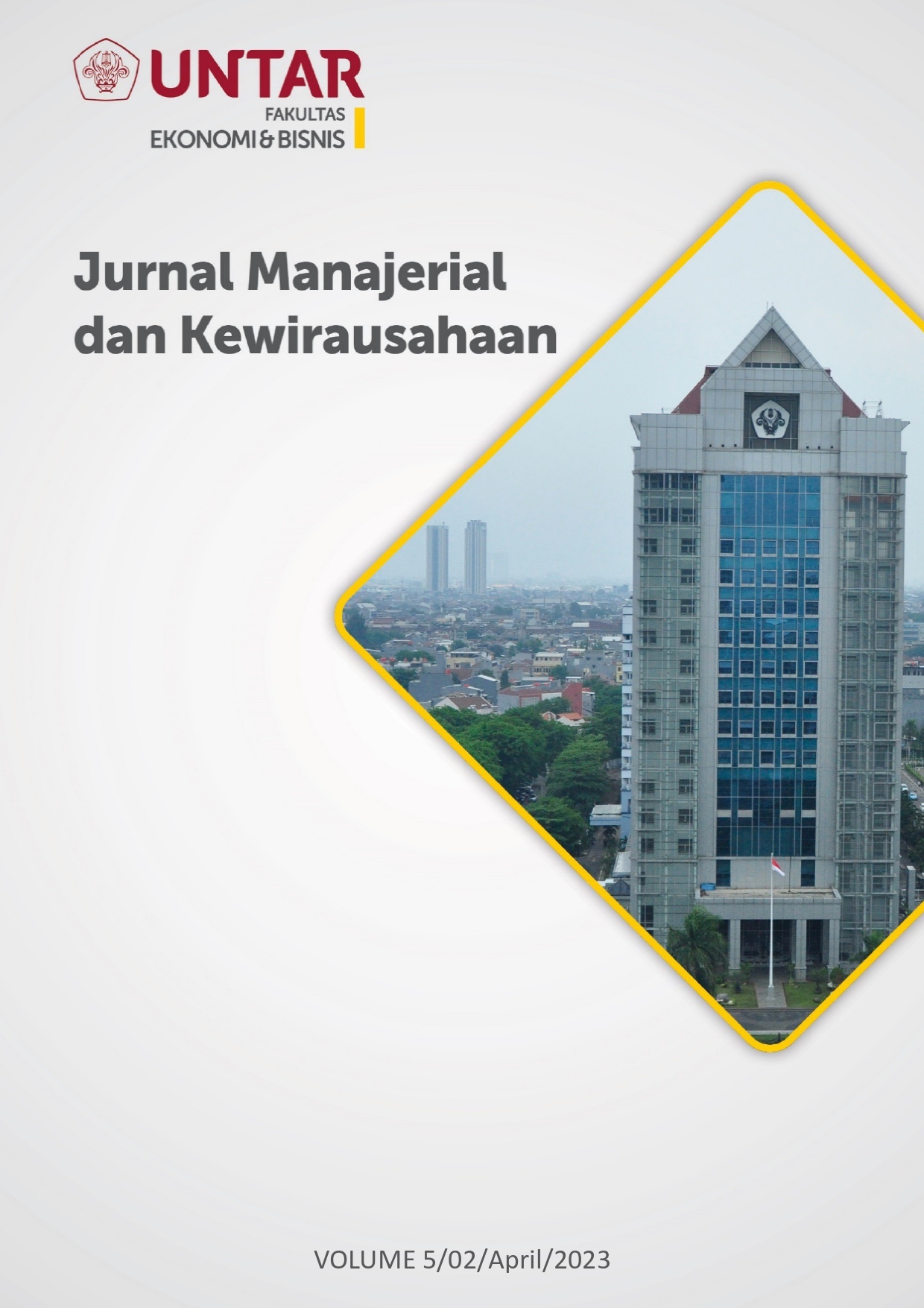Pengaruh Autentisitas Merek dan Kualitas Produk terhadap Kepuasan Pelanggan Uniqlo di Jakarta
Main Article Content
Abstract
The purpose of this study is to test the effect of brand authenticity and product quality through customer satisfaction. This study used a sample of 236 Uniqlo customers in Jakarta. The data collection technique used is convenience sampling by distributing online questionnaires. The data were analyzed by using Partial Least Square-Structural Equation Modelling (PLS-SEM) technique in SmartPLS 3. The results of this study are brand authenticity and product quality positively affect customer satisfaction.
Article Details
Section

This work is licensed under a Creative Commons Attribution-NonCommercial-ShareAlike 4.0 International License.
This work is licensed under a Jurnal Muara Ilmu Ekonomi dan Bisnis Creative Commons Attribution-ShareAlike 4.0 International License.,/p>
References
Ahn, T., Ryu, S., & Han, I. (2004). The impact of the online and offline features on the user acceptance of internet shopping malls. Electronic Commerce Research and Applications, 3(4), 405-420. https://doi.org/10.1016/j.elerap.2004.05.001
Anderson, E. W., Fornell, C., & Lehmann, D. R. (1994). Customer satisfaction, market share, and profitability: Findings from Sweden. Journal of Marketing, 58(3), 53-66. https://doi.org/10.1177/002224299405800304
Bruhn, M., Schoenmuller, V., Schafer, D., & Heinrich, D. (2012). Brand authenticity: Towards a deeper understanding of its conceptualization and measurement. Advance in Consumer Research, 40, 567-576. https://www.researchgate.net/publication/263442915_Brand_Authenticity_Towards_a_Deeper_Understanding_of_Its_Conceptualization_and_Measurement
Busser, J. A., & Shulga, L. V. (2019). Involvement in consumer-generated advertising: Effects of organizational transparency and brand authenticity on loyalty and trust. International Journal of Contemporary Hospitality Management, 31(4), 1763-1784. https://doi.org/10.1108/IJCHM-10-2017-0685
Diputra, I. A., & Yasa, N. N. (2021). The influence of product quality, brand image, brand trust on customer satisfaction and loyalty. American International Journal of Business Management (AIJBM), 4(1), 23-34. https://www.aijbm.com/wp-content/uploads/2021/01/E412534.pdf
Eksangkul, N., & Nuangjamnong, C. (2021). The factors affecting customer satisfaction and repurchase intention: A case study of bubble tea in Bangkok, Thailand. AU-HIU International Multidisciplinary Journal, 2(2), 8-20. https://www.researchgate.net/publication/362175856_The_Factors_affecting_Customer_Satisfaction_and_Repurchase_Intention_A_Case_Study_of_Bubble_Tea_in_Bangkok_Thailand
Forsythe, S., Presley, A. B., & Caton, K. W. (1996). Dimensions of apparel quality influencing consumers' perceptions. Perceptual and Motor Skills, 83(1), 299-305. https://doi.org/10.2466/pms.1996.83.1.299
Fritz, K., & Schoenmueller, V. (2017). Authenticity in branding - exploring antecedents and consequences of brand authenticity. European Journal of Marketing, 51(2), 324-348. https://doi.org/10.1108/EJM-10-2014-0633
Hair, J. F., Ringle, C. M., & Sarstedt, M. (2011). PLS-SEM: Indeed a silver bullet. Journal of Marketing Theory and Practice, 19(2), 139-152. https://doi.org/10.2753/MTP1069-6679190202
Hair, J. F., Risher, J. J., Sarstedt, M., & Ringle, C. M. (2019). When to use and how to report the results of PLS-SEM. European Business Review, 31(1), 2-24. https://doi.org/10.1108/EBR-11-2018-0203
Henseler, J., Ringle, C. M., & Sarstedt, M. (2015). A new criterion for assessing discriminant validity in variance-based structural equation modeling. Journal of the Academy of Marketing Science, 43(1), 115-135. https://doi.org/10.1007/s11747-014-0403-8
Hoe, L. C., & Mansori, S. (2018). The effects of product quality on customer satisfaction and loyalty: Evidence from Malaysian engineering industry. International Journal of Industrial Marketing, 3(1), 20-35. http://dx.doi.org/10.5296/ijim.v3i1.13959
Keni, K. & Sandra, K. K. (2021). Prediksi customer experience dan service quality terhadap customer loyalty: Customer satisfaction sebagai variabel mediasi. Jurnal Muara Ilmu Ekonomi dan Bisnis, 5(1), 191-204. https://doi.org/10.24912/jmieb.v5i1.11196
Kotler, P., & Armstrong, G. (2014). Principles of Marketing (15th ed.). Pearson.
Lopez, M. E., Garcia, S. D., & Garcia, S. (2020). Formation of customer-based brand equity via authenticity: The mediating role of satisfaction and the moderating role of restaurant type. International Journal of Contemporary Hospitality Management, 32(2), 815-834. https://doi.org/10.1108/IJCHM-05-2019-0473
Mansourimoayyed, F., Hoseini, H. K., & Sabahi, H. (2020). The analysis of customer satisfaction of organic products and the impact of touchpoints, brand experience and shopping values. Journal of Advanced Pharmacy Education & Research, 10(4), 143-149. https://japer.in/storage/models/article/4vX8JLTwLP63R4hcvVJRRLCizjgA7kgbTA65OXWcl8T6ohmJcHsnby7jDir8/the-analysis-of-customer-satisfaction-of-organic-products-and-the-impact-of-touchpoints-brand-expe.pdf
Muskat, B., Hortnagl, T., Prayag, G., & Wagner, S. (2019). Perceived quality, authenticity, and price in tourists’ dining experiences: Testing competing models of satisfaction and behavioral intentions. Journal of Vacation Marketing, 25(1), 1-19. http://dx.doi.org/10.1177/1356766718822675
Novianti, V. & Ruslim, T. S. (2022). Pengaruh product quality, monetary promotion terhadap brand loyalty dengan satisfaction dan brand image sebagai mediasi. Jurnal Manajerial dan Kewirausahaan, 4(2), 525-533. https://doi.org/10.24912/jmk.v4i2.18261
Tran, V. D., & Nguyen, N. T. (2022). Investigating the relationship between brand experience, brand authenticity, brand equity, and customer satisfaction: Evidence from Vietnam. Cogent Business & Management, 9(1), 1-20. https://doi.org/10.1080/23311975.2022.2084968
Tran, V. D., Vo, T. N., & Dinh, T. Q. (2020). The relationship between brand authenticity, brand equity and customer satisfaction. Journal of Asian Finance Economics and Business, 7(4), 213-221. http://dx.doi.org/10.13106/jafeb.2020.vol7.no4.213
Uzir, M. H., Jerin, I., Halbusi, H. A., Hamid, A. B., & Latiff, A. S. (2020). Does quality stimulate customer satisfaction where perceived value mediates and the usage of social media moderates? Heliyon, 6(12), 1-19. https://doi.org/10.1016/j.heliyon.2020.e05710
Yuan, L. S., Jusoh, M. S., Yusuf, D. H., & Ghani, M. R. (2020). The relationship between product quality, e-service quality and brand image on customer satisfaction: Preliminary investigation in Perlis. International Journal of Business and Management, 4(5), 43-54. http://dx.doi.org/10.26666/rmp.ijbm.2020.5.6

